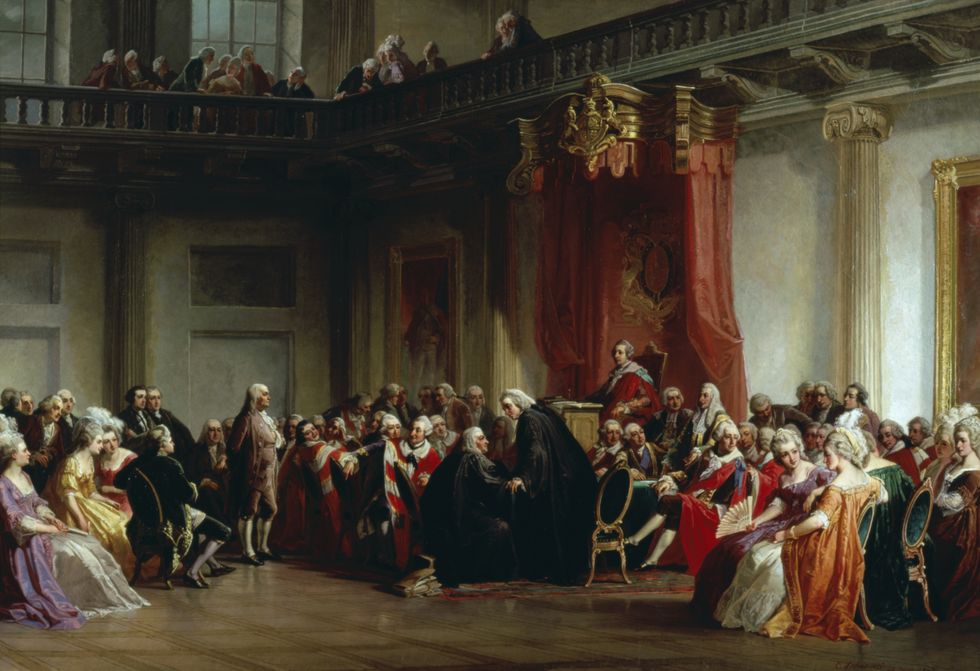Morgan concludes that Benjamin Franklin became a man of strong moral character and will. He helped Philadelphian’s to better themselves and tried to create a better union between the British Empire and the America colonies but, ultimately failed. Franklin let lesser men in the British Parliament and London insult and abuse him, conclusively defeating him through lack of respect. Due to his defeat in Britain, Franklin abandoned all hope of his vision and returned home to America. In America, Franklin continued the vision of greater, narrower minded, and less able men, and worked for colonial America’s independence. Franklin worked tirelessly as a great man who succeeded in Philadelphia, then failed in England, leading him to play a pivotal role in igniting the American Revolution.
Not far into Franklin’s life, he decided to flee a Calvinist Boston and take refuge in a religiously tolerant Philadelphia. As a Diest, Franklin did not believe in a current God, rather one who created a universe and left it and the people in it to fend for themselves. Franklin’s beliefs yielded rewards including friends and respect from said friends. These beliefs however, also brought about several inconveniences for the churches of Pennsylvania. A feud between Franklin and the head of one of the churches ranked amongst the more significant. Franklin brought his beliefs to a, more or less ignorant, Pennsylvania with his list of virtues (15-25). Aside from detailing his giving nature in pamphlets in order to benefit and better the people of Philadelphia, Franklin became a world renowned scientist for his work of the same purpose. Some of his scientific achievements included the Franklin stove and the lightening rod. Franklin made a great many scientific discoveries in his time counting the presumptive different densities of liquids and the basics of Darwinism. However, these inventions revolutionized technology in Philadelphia and won him a personal victory in England in addition to the previous public victories in Philadelphia (1-15).
Upon arrival in England, a local University granted Franklin an honorary diploma due to his success in philanthropy in Philadelphia. Franklin’s bastard William became the royal governor of the colony of New Jersey. Additionally, Franklin’s initial, personal happiness in England for all intents and purposes came into fruition (74-82). However, the Penn family, who owned Pennsylvania, took issue with the fact that Franklin had defied England’s parliamentary supremacy by helping to create colonial militia and defy tax law in order to better raise money to defend against threats in the colonies. The Penn family insulted Franklin by calling him a lesser man and stating he had no right to confront them (85-95). Disgusted and defeated, Franklin returned to America with nothing less than a notion to break away from the British Empire, where, as before, he wanted the British to simply treat the colonists as their equals and establish a local autonomy.
Upon returning to America, a growing insurrectionist movement met Franklin with open arms. Furious from the declaration by the king that the colonies were in open rebellion, the passing of the prohibitory acts, and the tossing out of the “olive branch partition,” America had become ready for independence. Thomas Paine became the first to publicly address Franklin’s already brewing viewpoints on independence and poke fun at the monarchy in England. The British quickly swept in to squash the rebels at Lexington however, were met with an army of colonists at Concord. Franklin helped to write the Declaration of Independence, held secret meetings with the Freed in order to fund the American cause for independence, exposed the British attitude towards Americans by releasing letters from British officials, and, wrote and presented the Articles of Confederation to the Continental Congress all in order to discreetly steer the Americans in the direction of winning a war of independence (134-162).
Ultimately, despite Franklin’s initial public and personal success, it became the myopic attitudes of the British that alienated Franklin and his fellow Americans that sparked the American revolution. Franklin’s initial public success in Philadelphia and private success in England made him more susceptible to downfall. This downfall would ultimately happen at the hands of the Penn family and the British Parliament. When Franklin returned home, he had become ready to throw away the notions of local autonomy and parliamentary supremacy and create an independent America. If not for the clash between the principles of two powerful collections of minds, Franklin would not have been alienated and the American Revolution may never have happened.
Morgan, Edmund. Benjamin Franklin, 1-185.Yale University Press, 2002.











